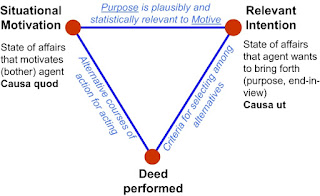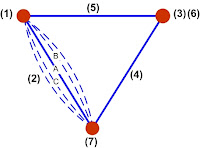"...for in so far as we say an action is purposive at all, no matter at what level of conscious deliberation, there is a calculation which could be constructed for it. .. And it is by eliciting some such calculation that we explain the action." LAE 123and C. Devanny,
"...what we very often want is a reconstruction of the agent's calculation of means to be adopted toward his chosen end in the light of the circumstances in which he found himself." 116 (LAE 122)Next figure is adapted from Rex Martin's Historical Explanation p. 69
Rex Martin expressed the meaning of each node and side of the triangle in a schema of seven propositions:
- The agent perceived himself to be in a certain situation and was disposed to act toward it in some definite way (e.g., as Caesar was disposed to curb the hostile incursions of the Britons).
- There were a number of alternative courses of action (designated as A-e.g., invading-B, C, and so on) open to the agent who had the situational motivation described in (1).
- The agent did want to achieve or accomplish such-and-so end (e.g., conquest), which he believed would satisfy his situational motivation.
- He believed that doing A was, in the circumstances already described, a means to accomplishing his stated purpose or a part of achieving it.
- There was no action other than A believed or seen by the agent to be a means to his goal which he preferred or even regarded as about equal.
- The agent had no other purpose which overrode that of accomplishing such-and-so.
- And we might add, although Collingwood gave little attention to it, that the agent knew how to do A, was physically able to do it, would be able to do it in the situation as given, had the opportunity, etc
I interpreted it graphically as (though not sure on 5 and 6):
The statistical criteria for proving the relevance are taken from Wesley Salmon:
- Statistical relevance: (called simple relevance by Martin)
- Screening-off: (Outweighing or overruling)
- Homogeneity of the reference class (intrinsic relevance)


No comments:
Post a Comment